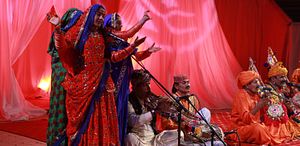In the closing months of this year, after a seven-year hiatus, the family-run Rafi Peer Theater Workshop (RPTW), Pakistan’s best-known theater group, has put on a number of festivals at public locations in both Lahore and Islamabad. With the beautiful Mystic Music Sufi Festival, the Youth Performing Arts Festival, and the Dance Festival, the cultural capital of the country, Lahore, was once again alive with festivals and art and culture events.
However, Sadaan Peerzada, the group’s chief operating officer, admitted that it wasn’t easy. After being targeted by terrorists in 2008 during its immensely popular World Performing Arts Festival (WPAF) – an event that brought performing artists from across the globe for 90 shows over 11 straight days – and being targeted again in 2010 at its headquarters in Lahore, the RPTW buckled under the pressure. Peerzada also lost his twin brother, Faizan, in 2012. The brothers had been the faces of their company, as well as the driving force, keeping alive their father’s legacy of art, culture and puppetry.
“It’s sad because festivals take a lot of time to build, especially in a country like Pakistan where there’s lukewarm government support,” states Peerzada. We’re sitting at the RPTW head office in Lahore. Framed posters of the group’s past festivals line the walls of their large, colorful, office. Invites to one of the group’s recent festivals are stacked on the table before us, waiting to be mailed out to reporters and journalists at local media houses.
The compound also consists of the RPTW’s lovely Museum of Puppetry and its café, Peerus, both of which were partially damaged in the 2010 bomb blasts. “We’ve been running the RPTW for 35 years; we’re very proud of it and have always had a very strong connection and attachment to Pakistan.”
Speaking about the first attack in 2008, Peerzada recalls that at the time, the RPTW had almost reached its zenith in terms of festival success. “We brought these festivals to a stage where our WPAF was the biggest festival [of its kind] in Asia. It was a big achievement. When it was disrupted by the security situation, I think the government should have come forward to host it with us. These past seven years have been Pakistan’s saddest patch [vis-à-vis art and culture] in which we’ve lost a lot. We’ve lost confidence, we lost the new generation…we’ve created a very strange gap – seven years of no activity, people aren’t in the habit of attending festivals and shows anymore. That habit in itself is a training.”
When the first bomb went off during the WPAF in 2008 at the city’s Gadaffi Stadium, Peerzada was walking out of the stadium’s men’s room. He recalls: “I could feel the wave of the bomb as it went off. I said: Oh God, not here. I ran out; obviously we were all over the place. Three bombs went off that night. They intercepted the fourth bomb planted near the car park. That was the actual bomb, the big one, because they wanted the people to reach their cars when it would go off for maximum impact. It was very well planned. The next day we caught this guy, he was there with some device and a diagram of the whole venue. Our office had been marked, so we were going to be targeted that day.”
Stating that the RPTW’s survival over the seven-year gap was nothing short of a miracle, Peerzada mentioned that his family considered leaving Pakistan for good. “There were times where we felt we should leave Pakistan and go to a place where we could at least work freely. But we didn’t because we’re too attached to this country.”
In Lahore, the Gadaffi Stadium and the RPTW go hand in hand. Since its founding in the 1970s, the group has hosted countless events at the stadium and it is their second home. Returning to Gadaffi this year to host the YPAF after such a long absence was thus both surreal and emotional for the group. “It was a great feeling to go back to Gadaffi for our youth festival. It was a great trauma to carry out these festivals without any government help. We had a very strong emotional drive that we kept alive. Festivals are a part of this country that need to be developed and sustained.”
However, the RPTW faced a harrowing experience this month when the government withdrew the RPTW’s No Objection Certificate (NOC) hours before the Mystic Music Sufi Festival was due to open at Gadaffi. Having flown in performers from Iran and Syria, in addition to local performers, the RPTW finally received the NOC at the very last moment. In Pakistan, this kind of government apathy is considered the norm – the country’s artistic community has for decades had to survive without any kind of government support.
However the RPTW has been lucky to have the support of the Norwegian government, which has continued to provide funds and support to the group over the years. Even the group’s Museum of Puppetry is partially funded by the Norwegian government, which ought to be an embarrassment for the Pakistani government. “They [the Pakistani government] need to have the vision to support culture and art in Pakistan – like the Norwegians. It’s the lifeline of this country.”
Having mapped out festivals for the next three years, the RPTW is also hard at work archiving its work. From images to sound clips and videos – the group’s body of work is extensive, far more than any performing arts company in Pakistan.
“We’re not nervous,” insists Peerzada, when asked about whether or not the group is uneasy about the imminent festivals and events, “Not at all…because this is what we’ve done all our lives.”
Sonya Rehman is a journalist based in Lahore, Pakistan. She can be reached at: sonjarehman [at] gmail.com






































